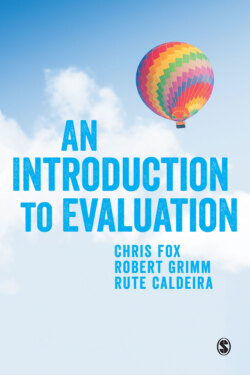Читать книгу An Introduction to Evaluation - Chris Fox - Страница 18
На сайте Литреса книга снята с продажи.
Our preferred definition of evaluation
ОглавлениеThe many definitions of evaluation suggest that it is not easy to pin down the concept. Indeed, some observers have argued that this is a pointless task. For example, some evaluators reject objective ‘scientific’ approaches to evaluation, arguing instead that because the human world is socially constructed evaluation is itself a social construct. There are multiple social constructs and therefore from this relativist point of view there is no right way to define evaluation. Thus, by the end of the decade, Guba and Lincoln were arguing: ‘There is no answer to the question, “But what is evaluation really?” and there is no point in asking it’ (1989: 21).
We recognise the importance of purpose and methods in defining evaluation, but also take the view that what is crucial for defining evaluation is the emphasis on a process of determining the merit, worth or value of something, along the lines suggested by Scriven.
Distinguishing evaluation from research as a practice designed to establish the value of an entity has notable implications that will resurface throughout this book. If we accept that the purpose of evaluation is to determine the value of the entity being evaluated, and that the products of an evaluation are designed to improve the thing being evaluated or to assess its impact, this has important repercussions for evaluation and for evaluators. If we return to the very first definition of evaluation that we considered, i.e. Mark et al.’s (2006) view of evaluation as a ‘politicized practice that nonetheless aspires to some position of impartiality or fairness’, we can start to see the potential tensions in a practice that is at once politicised but also aspires to impartiality or fairness.
Some would go further and see in the literature the suggestion that evaluation is either a political activity or that it serves a political purpose (Palfrey et al. 2012). In their review of the relevant literature Palfrey and colleagues distinguish between these two possibilities. Citing the work of Patton (1988) they suggest that, at a minimum, if evaluation is intended to improve services then, in the public sector, the decision makers who will act on evaluation findings are either local or national politicians. In this case evaluation serves a political purpose. However, many commentators on evaluation go further and, as Palfrey et al. (2012) note, with particular reference to the collected work of Guba and Lincoln, some see evaluators as ideologically committed with political sympathies that should influence the design of their evaluations. Whichever view is taken, they argue that over recent decades:
evaluation has come to be associated for the past few decades as a potent ally of politicians in that it is a means of assessing the ‘value’ of projects, programmes and policies. (Palfrey et al. 2012: 29)
The implication of this is that:
In the real world of politics, despite the mass of literature supporting and promoting evaluation as a subject worthy of intense bookish activity, it has to be acknowledged that for all its intellectualising credentials it is a servant and not an equal of politicians. (2012: 29)
